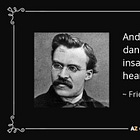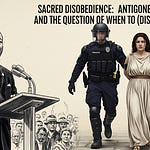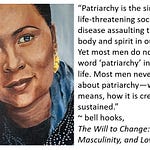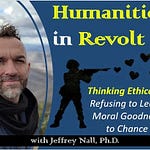Jeffrey Nall, Ph.D. delivered this talk to the Unitarian Universalist Church of Brevard, January 28, 2024.
Jeffrey Nall, Ph.D., is the civically engaged scholar and speaker behind Humanities in Revolt. He brings the timeless, liberating insights of the humanities to live audiences, from community groups and congregations to universities and conferences. Message him below to inquire about speaking availability for your congregation, campus, or community group.
Albert Einstein is one of the most beloved figures in American history. In 2005, Einstein joined Rev. Dr. Martin Luther King, Jr., Abraham Lincoln, and Eleanor Roosevelt in being identified as one of the top 25 “greatest Americans” by more than 2.4 million voters. Einstein has come to symbolize “science,” “intelligence,” and the aloofness of the scholarly mind.
America’s fondness for Einstein is ostensibly reflected in the fact few he is among the most quoted figures in American culture. The irony is that much of what we’ve come to think about Einstein is inaccurate. And many of his most important ideas are left obscured and unrecognized.
For starters, many of our favorite Einstein quotes we're never said or written by Einstein. A few favorites that Einstein didn't author include:
“The definition of insanity is doing the same thing over and over again and expecting different results.”
“Everyone is a genius. But if you judge a fish by its ability to climb a tree, it will live its whole life believing that it is stupid.”
It’s a shame that Einstein is best known for statements he didn’t make. An actual reading of Einstein’s writing reveals an insightful, to the point thinker who is indeed quotable. Consider this sampling of quotes from his 1931 essay, “The World As I See it”:
“I regard class distinctions as unjustified and, in the last resort, based on force. I also believe that a simple and unassuming life is good for everybody, physically and mentally.”
“The ideals which have lighted my way, and time after time have given me new courage to face life cheerfully, have been Kindness, Beauty, and Truth. Without the sense of kinship with men of like mind, without the occupation with the objective world, the eternally unattainable in the field of art and scientific endeavors, life would have seemed to me empty.”
Einstein saw science as a profound spiritual encounter with a mysterious universe.
“The most beautiful experience we can have is the mysterious. It is the fundamental emotion which stands at the cradle of true art and true science. Whoever does not know it can no longer wonder, no longer marvel, is as good as dead, and his eyes are dimmed.”
Einstein's writing reveals an attitude toward the religious and spiritual that frustrates simplistic conceptions of the religious experience.
“A knowledge of the existence of something we cannot penetrate, our perceptions of the profoundest reason and the most radiant beauty, which only in their most primitive forms are accessible to our minds—it is this knowledge and this emotion that constitute true religiosity; in this sense, and in this alone, I am a deeply religious man.”
He also rejected notions of life after death and a personal God.
“I cannot conceive of a God who rewards and punishes his creatures, or has a will of the kind that we experience in ourselves. Neither can I nor would I want to conceive of an individual that survives his physical death; let feeble souls, from fear or absurd egoism, cherish such thoughts. I am satisfied with the mystery of the eternity of life and with the awareness and a glimpse of the marvelous structure of the existing world, together with the devoted striving to comprehend a portion, be it ever so tiny, of the Reason that manifests itself in nature.”
These quotes may not make for the best bumper stickers, but they sure do make for powerful contemplation and conversation starters.
Many people are confounded by Einstein’s atheistic rejection of belief in a personal deity responsible for creating and watching over humanity and his simultaneous embrace of religion. The source of the problem is not Einstein’s purportedly conflicting views but our own conceptual conflation of religion and belief in God.
Many understand religion to be identical with believing in a personal God. But Einstein joined thinkers including Erich Fromm and Abraham Maslow in understanding “religion” as a byword for our highest human values—the existential commitments that transcend the animal desire for basic survival. Einstein actually promoted efforts to popularize “ethical culture,” and consistently argued science required the humanities to foster wisdom.
Check out these previous essays exploring quotes misattributed to Confucius and Nietzsche and some of the actual wise words each thinker actually wrote/said
Einstein is misunderstood in the sense that he is perceived as a purely “science and facts” thinker. As previously discussed, Einstein advocated for generalized education over specialization and believed scientific knowledge was incomplete without the humanities and ethical knowledge. These views run counter to contemporary assumptions about the priority of science and technology, the relative unimportance of humanities, and confidence that narrow specialization early in education is beneficial. Today, the humanities offer us a space to unfold our full human selves to explore not only the factual but also the conceptual, the ethical, the existential; to contemplate those highest values which gives meaning and purpose to our lives.
Another area of Einstein’s beliefs that few Americans understand is his political philosophy. Like Rev. King, Einstein was an avowed socialist who found significant fault in capitalism’s economic and cultural effects. What is perhaps even more mystifying to contemporary readers is that Einstein argued for socialism and against capitalism on grounds that capitalism and its pathological emphasis on competition harmed our social relations and individuality. In an essay titled “Why Socialism?” (1949), he wrote:
“This crippling of individuals I consider the worst evil of capitalism. Our whole educational system suffers from this evil. An exaggerated competitive attitude is inculcated into the student, who is trained to worship acquisitive success as a preparation for his future career.”
The very fact of Einstein’s greatest scientific discoveries being made during his leisure time and for the sake, primarily, of a love of knowledge rather than profit confounds the dominant cultural belief that people are primarily motivated to work for profit. Einstein explicitly rebuked this claim, insisting that we are at our best when our work is intrinsically motivating.
A final point worth noting is that Einstein was a fierce critic of militarism and nationalism. His final days were quite literally spent singing his friend, philosopher Bertrand Russell’s manifesto calling for the abolition of war and writing a speech calling on human beings around the globe to recognize their common humanity in order to stave off potential nuclear annihilation as the Soviet Union and United States faced off.
Some of these topics are addressed in the talk contained within this post. The presentation was delivered on January 28, 2024 before the UU Church of Brevard in West Melbourne, Florida.
Clips of the full lecture will also be published for public viewing on TikTok. Readers interested in learning more about Einstein’s views on education, ethics, and the humanities can read the pieces below.
Those interested in learning more about Einstein’s work on war, peace, and his mixed feelings about Zionism and the creation of Israel can look forward to a forthcoming article which engages with primary sources to address these topics in detail. The article will be available to all subscribers.
Recommended Reading: Einstein’s Ideas and Opinions (Three Rivers Press). It’s a small book packed with letters, essays, speeches and more covering a range of topics. You can buy a new copy for under $20 or find a used copy online for less than $10, shipping included.
Help this work reach others:❤️ like,🔄 share, 🗨️ comment, and✊ subscribe


















